Say you go to the doctor and have to undergo several tests and/or procedures. The whole time you’re thinking, “I have insurance. I’m covered.” But then a few weeks go by and you receive a letter in the mail stating that your insurer has denied coverage for the services you had done—and you’re not sure what your next course of action should be.
Unfortunately, denials are not uncommon. There are two major methods of avoiding them—take steps to prevent them from happening in the first place, or successfully appeal the denial. Let’s look at some of the most common ways you can avoid a medical claim denial.
1. Keep your treatment or service in-network if possible.
Many denials occur because patients go out-of-network for their care. Make sure you fully understand the in-network/out-of-network status of any providers involved in your care.
If you do go out-of-network for care, you probably don’t have a case to appeal a claim. However, if there are no in-network physicians in your area (“area” is typically defined as a 35 mile radius), you can appeal for network adequacy.
2. Get the appropriate pre-approvals prior to receiving treatment.
Some insurance companies may require a pre-certification, pre-authorization or a referral to a specialist before you receive care. Call your insurance company and ask if you need a referral or preauthorization.
3. Make sure your treatment is considered “medically necessary.”
Your insurance company reviews claims and determines whether or not they are medically necessary. If your insurance company believes your treatment falls outside the typical course of treatment, you may be denied coverage. For example, you’re taking a brand-name drug for high blood pressure instead of a generic brand. The insurance company denies the coverage because there is an effective generic equivalent available for treating the condition.
But there may be exceptions to this—for instance, if you had an allergic reaction to the generic version of that drug, and that’s why your doctor prescribed the brand-name drug. In a case like that, call your insurance company and explain the situation to them. It’s likely that your doctor will have to fill out a Medical Necessity form and send it to your insurance carrier.
4. Make sure all your information is complete.
The complexity of filing and processing claims can lead to denials simply because of incorrect or missing codes or incomplete patient information. Make sure to:
- Review your explanation of benefits (EOB). Many times the EOB will explain that the claim was missing information.
- Call your insurance company to see what information needs to be corrected.
Navigating the healthcare system and understanding your insurance and benefits can be frustrating. You don’t have to handle a denied claim or an appeal alone. Find out if your employer includes an advocacy service as part of your benefits package. If so, reach out to them for assistance with issues such like a denied claim and filing an appeal.
Want to find out more about how a Health Advocate can help you? Email your questions to me at nhess@healthadvocate.com. You just might see your question answered in an upcoming “Ask a Health Advocate” column!



